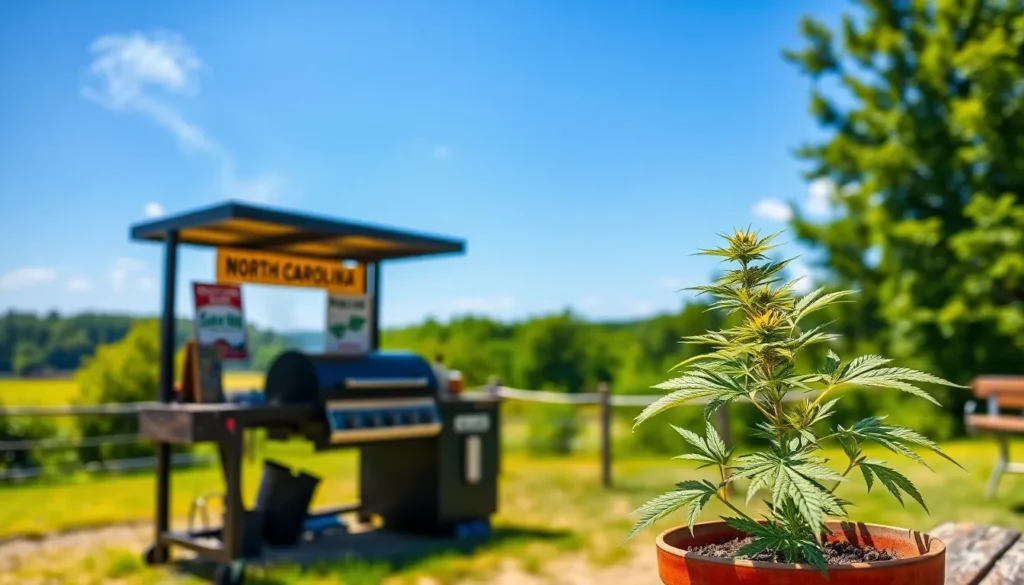In the land of sweet tea and southern hospitality, the question of whether weed is illegal in North Carolina sparks more debate than who makes the best barbecue. With the state’s rich history and evolving laws, it’s no wonder folks are scratching their heads. Is it time to roll one up or should they stick to rolling biscuits instead?
While some states are lighting up with legalization, North Carolina remains a bit of a buzzkill. The complexities of cannabis laws can feel like deciphering a secret menu at a hipster café. So, what’s the real deal? Join the conversation as we unravel the tangled web of North Carolina’s cannabis regulations, and find out if it’s time to embrace the green or keep it under wraps.
Table of Contents
ToggleOverview of Marijuana Legislation in North Carolina
Marijuana legislation in North Carolina reflects a complicated legal landscape. Understanding the historical and current context clarifies the state’s evolving stance on cannabis.
Historical Context of Cannabis Laws
Pre-1970, marijuana laws in North Carolina mirrored federal regulations. In 1970, the state categorized cannabis as a Schedule VI substance. The law discouraged cultivation, possession, and sale, fostering a longstanding prohibition. In 2014, lawmakers legalized low-THC cannabis oil for medical purposes, signaling a shift. The push for further reform gained momentum with ongoing discussions around medical marijuana access.
Current Legal Status of Marijuana
Marijuana remains illegal for recreational use in North Carolina, classified as a Schedule I substance. Possession of up to 0.5 ounces results in a misdemeanor charge, carrying a punishment of up to 45 days in jail. Medical marijuana legislation lags behind, with proposals often facing significant legislative hurdles. Advocates continue to push for comprehensive medical cannabis laws to expand access and protect patients. Public opinion increasingly favors reform, giving rise to hope for eventual legalization.
Medical Marijuana Laws in North Carolina

North Carolina’s medical marijuana laws represent a significant step in the state’s cannabis policy evolution. Low-THC cannabis oil became legal in 2014, but comprehensive medical marijuana reform remains pending.
Qualifying Conditions for Use
Only specific medical conditions qualify for medical marijuana use in North Carolina. These include conditions such as epilepsy, multiple sclerosis, and Parkinson’s disease. Additionally, severe arthritis and cancer also meet the criteria. Patients must obtain a certification from a licensed physician who specializes in treating these ailments. Approval from a doctor does not guarantee access; it simply initiates the process for potential users. Public opinion increasingly supports broader access to medical marijuana, indicating momentum for future legislative changes.
The Application Process
Completing the application process for medical marijuana requires several steps. After obtaining a doctor’s recommendation, patients must register with the North Carolina Department of Health and Human Services. A completed application form and relevant medical records must accompany the submission. Approval can take several weeks, and applicants should regularly check their status online. Registered patients may access low-THC cannabis oil, but the process for full medical marijuana access remains unclear. Continued advocacy for policy reform emphasizes the urgency for clearer and more comprehensive application guidelines.
Recreational Use of Marijuana
Recreational marijuana remains illegal in North Carolina. The state’s laws classify it as a Schedule I substance, placing it alongside other controlled substances.
Legal Implications of Possession
Possession of marijuana, even in small amounts, leads to significant legal consequences. Under current law, possessing up to 0.5 ounces results in a misdemeanor charge, carrying a maximum penalty of 45 days in jail and a fine of up to $200. Larger quantities invite more severe penalties. For example, possessing more than 0.5 ounces can result in felony charges, leading to imprisonment of a year or more. Individuals caught in possession face potential long-term effects on their criminal records, impacting future employment opportunities.
Consequences of Distribution
Distribution of marijuana carries harsher penalties in North Carolina. Selling any amount, even a small quantity, constitutes a felony. Offenders face imprisonment of up to 25 months for distributing less than 10 pounds. Larger amounts increase the seriousness of charges; possession of 10 pounds or more can lead to up to 35 months in prison. Convictions for distribution also result in hefty fines and long-lasting impacts on the individual’s community standing and future prospects. Authorities aggressively pursue those engaged in distribution, making it a high-risk endeavor.
Public Opinion on Marijuana Legalization
Public sentiment around marijuana legalization in North Carolina shows a noticeable shift toward support. Many surveys indicate that a majority of residents favor expanded access to cannabis.
Polling Data and Trends
Recent polls reveal that over 60% of North Carolinians support legalizing recreational marijuana. Trends show this support has steadily increased, particularly among younger demographics. Surveys frequently highlight that a significant portion of respondents believe marijuana should be treated similarly to alcohol. Additionally, urban areas exhibit stronger backing for legalization compared to rural regions. This trend represents a growing acceptance within the community that could influence future legislation.
Influence on Legislators
Legislators increasingly pay attention to public opinion regarding marijuana. Increased support for legalization enhances pressure to reform existing laws. Polls showing strong backing lead lawmakers to consider drafting new bills addressing cannabis. Engaging in public discussions of marijuana can shape legislative agendas and priorities. Stakeholders and advocacy groups utilize this data to lobby for comprehensive reforms. As public favorability rises, the chances for legislative changes in cannabis regulations improve significantly.
Comparison with Other States
North Carolina’s cannabis laws stand in contrast to those of many neighboring states, highlighting a regional disparity in legalization attitudes.
Neighboring States’ Laws
Virginia recently legalized recreational marijuana use for adults aged 21 and older, allowing personal cultivation as well. South Carolina, however, takes a stricter stance, with cannabis classified as illegal for all purposes. Tennessee similarly maintains restrictive laws, though it has legalized low-THC medical cannabis. Noteworthy, Georgia permits low-THC oil for medical use under specific conditions, reflecting a more progressive approach similar to that of North Carolina’s medical cannabis law. The varying regulations among these states illustrate the complex patchwork of cannabis legislation existing in the southeastern U.S.
Nationwide Trends in Legalization
In recent years, more than 20 states have legalized recreational cannabis, showing a significant shift in public and political attitudes toward marijuana. A substantial portion of Americans, about 68%, now supports legalization, influencing legislative processes across the nation. Many states emphasize tax revenue, social equity, and public safety in their legalization efforts. Consequently, legislators are pushed to reconsider long-standing prohibitions as more states leverage the economic benefits from regulated cannabis markets. North Carolina’s continued prohibition may change as these national trends develop, highlighting the potential for evolving cannabis laws in the state.
The landscape of cannabis legality in North Carolina is complex and evolving. While current laws remain restrictive with marijuana classified as illegal for recreational use and limited medical access, public opinion is shifting. Increasing support for legalization suggests that change may be on the horizon. As more residents advocate for reform and legislators respond to this growing sentiment, North Carolina could soon find itself at a crossroads regarding cannabis policy. The ongoing dialogue around cannabis laws highlights the importance of staying informed about potential changes that could reshape the state’s approach to marijuana.





